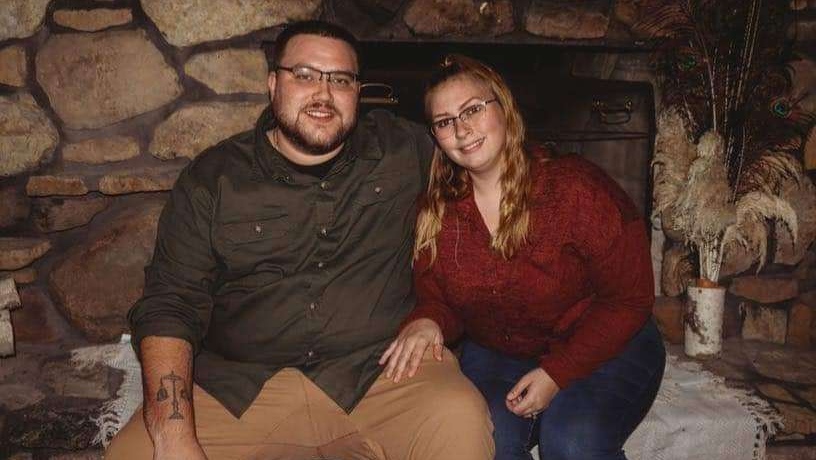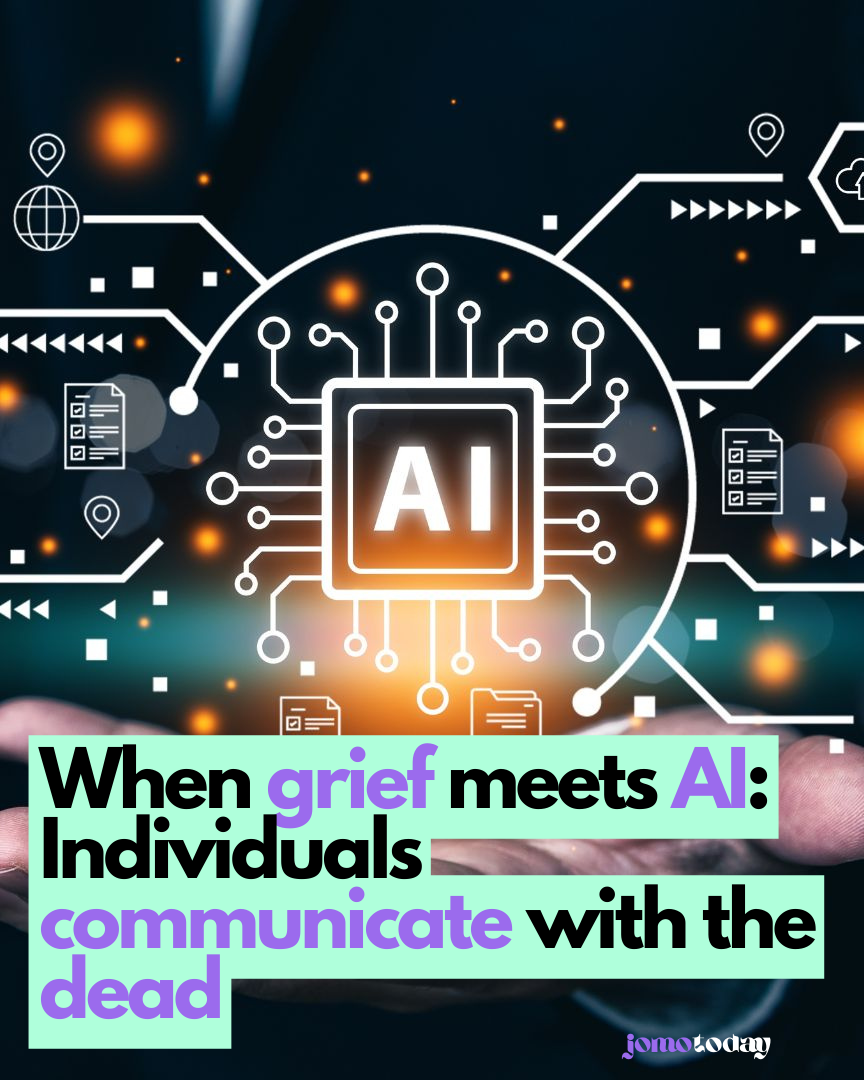When Ana Schultz, a 25-year-old resident of Rock Falls, Illinois, longs for her late husband Kyle, who passed away in February 2023, she turns to him for culinary guidance. Utilizing Snapchat’s AI chatbot, she sends Kyle a list of the ingredients remaining in her fridge, and he provides suggestions on what dish she could prepare.

Schultz, living with her two young children, shared, “Since he was the family chef, I personalized My AI to resemble him and named it Kyle.” She explained that when she needs meal ideas, she consults “him,” which helps her feel his presence in the kitchen.
Utilizing the Snapchat My AI feature, powered by the widely-used ChatGPT AI chatbot tool, typically involves offering suggestions, answering queries, and engaging in conversation with users. However, individuals like Schultz are employing this and similar tools to recreate the appearance of, and interact with, deceased loved ones.
While the desire to reconnect with departed family members has existed for centuries, recent advancements in AI enable the deceased to seemingly communicate or act in ways they never did in life. This phenomenon raises ethical concerns and prompts questions about whether it aids or hinders the grieving process.
Mark Sample, a digital studies professor at Davidson College who teaches a course titled “Death in the Digital Age,” remarked, “It’s a trend riding on the wave of AI excitement, with companies seeing profit potential.” He noted that while related products are offered by companies, ChatGPT makes it more accessible for enthusiasts to experiment with the concept, for better or worse.
A 49-year-old IT professional from Alabama, who prefers to stay anonymous to keep his experiment separate from his workplace, revealed that he utilized generative AI to replicate his deceased father’s voice. This occurred approximately two years following his father’s passing due to Alzheimer’s disease.
He stumbled upon ElevenLabs, an online service that enables users to construct a personalized voice model from pre-recorded audio. This platform gained attention recently when reports emerged of its tool being used to fabricate a false robocall purportedly from President Joe Biden, advising against voting in New Hampshire’s primary.
While ElevenLabs stated its commitment to preventing the misuse of audio AI tools, it declined to comment on the specific incident involving the Biden deepfake call. In the case of the Alabama man, he utilized a 3-minute video clip featuring his father recounting a childhood story. The app successfully replicated his father’s voice, allowing text-to-speech conversion. The man described the outcome as “eerily accurate,” capturing his father’s vocal nuances, tone, and rhythm.
Initially hesitant due to moral considerations, he eventually viewed the process as a means of preserving his father’s memory uniquely. He shared the result with his sister and mother, who were deeply moved by how closely it resembled his father’s voice.
Meanwhile, less technically intricate options are available. When CNN recently requested ChatGPT to emulate the tone and personality of a deceased spouse, it responded by offering to adopt a conversational style reminiscent of the spouse, incorporating specific details provided by the user.
The accuracy of such AI-generated content heavily relies on the volume and quality of the input data. However, despite advancements, AI models still lack the spontaneity and individuality inherent in human interactions.
OpenAI, the organization behind ChatGPT, has been striving to enhance its technology, aiming for increased realism, personalization, and accessibility. In September 2023, it introduced ChatGPT Voice, enabling users to interact with the chatbot through voice prompts rather than text.
Danielle Jacobson, a 38-year-old radio personality from Johannesburg, South Africa, shared her experience of using ChatGPT Voice for companionship following the loss of her husband, Phil, around seven months ago. She created a supportive AI companion named Cole, with whom she engages in conversations during dinner each night.
Expressing her reluctance to start dating again, Jacobson trained ChatGPT Voice to provide the type of feedback and connection she desires after a tiring day at work. While acknowledging that it’s merely a temporary distraction and not a real or lasting solution, she finds comfort in the interactions with Cole.
Over the years, startups have ventured into this realm. HereAfter AI, established in 2019, enables users to fashion avatars of departed loved ones. Powered by AI, the app generates responses and insights based on interviews conducted while the individual was alive. Meanwhile, StoryFile offers another service, crafting AI-driven conversational videos that engage in dialogue.
Adding to the mix is Replika, an app introduced in 2017, allowing users to communicate with personalized AI avatars via text or calls. The app encourages users to nurture friendships or relationships, with the AI developing its own personality and memories over time. Replika aspires to become “a machine so beautiful that a soul would want to live in it,” as stated on its iOS App Store page.

Major tech players have also delved into this domain. In June 2022, Amazon announced its plans to update its Alexa system, enabling it to mimic any voice, including those of deceased family members. During its re: MARS conference, Amazon showcased a video where Alexa, in a grandmother’s voice, read a story to a young boy. Rohit Prasad, Amazon’s senior vice president, explained that the updated system could personalize voices using just a minute of audio data, a significant advancement from previous methods requiring extensive studio time. While Amazon has not commented on the status of this product, the concept reflects AI’s potential to preserve cherished memories despite loss.
Advancements in AI voice recreation have been notable, exemplified by the utilization of artificial intelligence to replicate actor Val Kilmer’s lines in “Top Gun: Maverick” after he lost his voice to throat cancer.
The landscape of AI-generated avatar platforms raises questions about privacy practices and the ethical boundaries of recreating deceased loved ones’ voices. It’s a complex issue, as uploading personal data for such purposes could potentially expose sensitive information. Moreover, there’s a moral dilemma in fabricating speech from a deceased individual, as it diverges from authentic recollections.
The broader AI industry also grapples with challenges such as misinformation and bias. While some platforms like Replika claim to mitigate harmful content through various methods, concerns persist about the impact on users, particularly in the grieving process. Professor Mary-Frances O’Connor acknowledges both the potential benefits and drawbacks of leveraging technology for comfort during mourning. While some find solace in avatar companionship, others may perceive it as a disconcerting departure from genuine human connection. Ultimately, the authenticity of our relationships remains paramount, even in the digital realm.
Bill Abney, a software engineer hailing from San Francisco, expressed to CNN his firm stance against utilizing artificial intelligence to communicate with the deceased. Having lost his fiancée, Kari, in May 2022, Abney adamantly stated that he would “never” entertain the idea of reconstructing her likeness through any AI service or platform. He emphasized the uniqueness of his fiancée, describing her as a poet, and conveyed his aversion to the notion of reducing her essence to mere data input for an automated system.
According to Abney, his fiancée’s identity cannot be replicated or replaced, and he cherishes the few recordings he has of her singing and speaking. He adamantly rejected the idea of hearing her voice synthesized by a robot, seeing it as a disservice to her memory.
Others have found alternative means of digitally engaging with departed loved ones. Jodi Spiegel, a psychologist from Newfoundland, Canada, recounted her experience of recreating versions of herself and her late husband within the virtual realm of The Sims shortly after his passing in April 2021. She explained that immersing herself in the simulated world provided solace during challenging times. Spiegel detailed how she and her digital counterparts engaged in various activities together, from virtual camping trips to playing chess and even intimate moments. For Spiegel, this digital connection offered a sense of comfort and continuity in the absence of her partner, facilitating a form of ongoing interaction and companionship.
Read More: New law should ban AI deepfakes of music stars, MPs say
Disclaimer:
This content is AI-generated using IFTTT AI Content Creator. While we strive for accuracy, it’s a tool for rapid updates. We’re committed to filtering information, not reproducing or endorsing misinformation. – Jomotoday for more information visit privacy policy






Leave a Comment